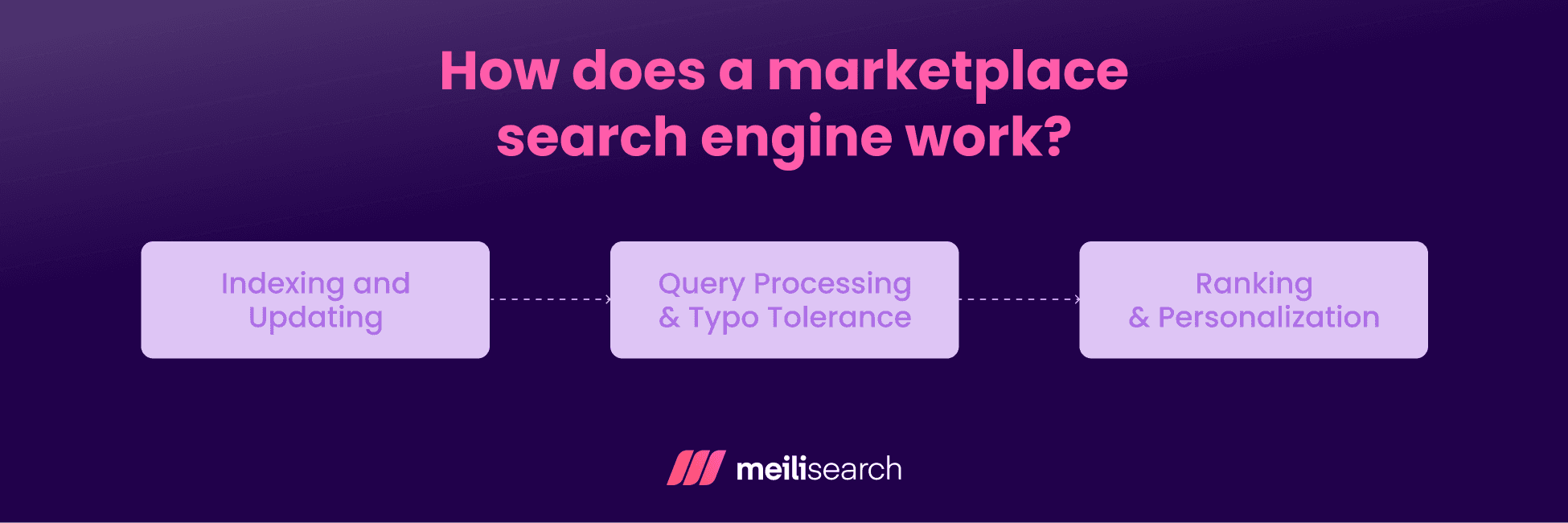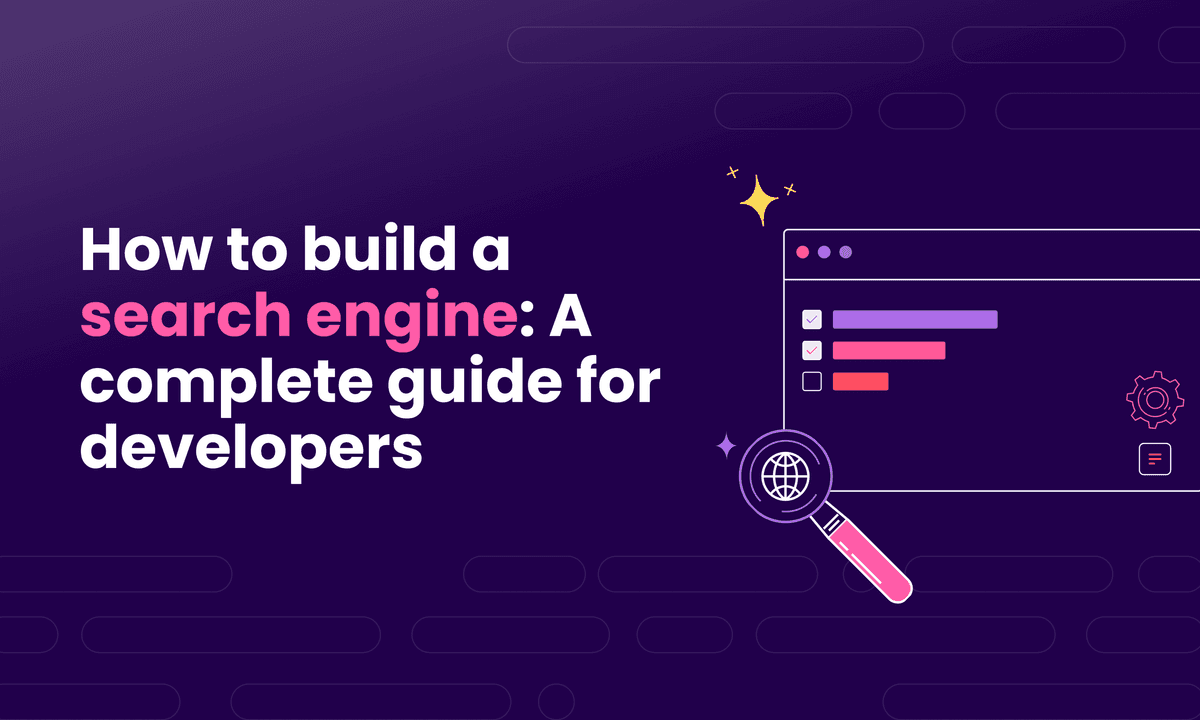Marketplace search engine: How to make one, top tools, & more
Learn what a marketplace search engine is, how it works, & how to create one. See the top tools to use, mistakes to avoid, and more.

In this article
Marketplace search engines are specialized tools designed to help users find what they need quickly and efficiently within an online marketplace such as Etsy, Amazon, eBay, and Walmart.
They must be fast, typo-tolerant, offer faceted filtering, and support different input formats (text, words, documents, images, voice, and more).
When done correctly, marketplace search engines impact user satisfaction, conversion rates, and sales by ensuring shoppers find precisely what they need.
Among the best tools for creating marketplace search engines are Elasticsearch, Algolia, and Meilisearch.
Let’s explore these and other alternatives further and learn how to seamlessly set up a marketplace search engine with Meilisearch.
What is a marketplace search engine?
Marketplace websites are e-commerce websites, but instead of relying on products from a single vendor, they aggregate and rank listings from numerous sellers, each with varying prices, availability, and ratings.
Since marketplaces have dynamic inventories that change frequently, the search engine must process vast and numerous indices with different data types in real-time while balancing relevance, speed, and accuracy for a seamless shopping experience.
Therefore, a marketplace search engine is a robust AI-powered system that can be complex to build from scratch.
How does a marketplace search engine work?
A marketplace search engine delivers fast, accurate results by combining advanced indexing, real-time querying, and intelligent ranking. Unlike traditional search systems, it must handle constantly changing inventory from multiple sellers while ensuring relevance and speed.

There are three key steps for a marketplace search engine to work:
- Indexing and Updating: Listings from multiple vendors are converted into vector embeddings—numerical representations of the raw data format (documents, text, images, etc.). This allows the engine to understand the semantic approximation between products even when search terms don’t match exactly. Since sellers update their listings frequently, the system must be able to run constantly to update the semantic space with new and updated embeddings.
- Query Processing & Typo Tolerance: The engine analyzes the query, accounting for typos, synonyms, and intent. Vector search enables semantic matching, returning relevant products even if the wording differs. Filters (price, brand, ratings) are applied dynamically to narrow results. Note that the query can tackle multiple indices, or a unified index that aggregates the data from the different listings.
- Ranking & Personalization: Results are ranked using machine learning (ML) algorithms that weigh factors like popularity, seller reputation, price competitiveness, and user behavior.
Why is a search engine important for an online marketplace?
A fast and accurate AI search engine is key for online marketplaces to improve customer satisfaction, reduce bounce rates, and increase revenue.
A marketplace that does not rely on AI-powered search engines will lose market share to competitors that provide a better user experience.
A good example of a marketplace that succeeded in providing faster and more relevant results is Qogita, which integrates the Meilisearch API into its infrastructure.
“Meilisearch has empowered us to deliver lightning-fast and highly relevant search results tailored to our customers' needs,” said Ivo Silva, Engineering Director at Qogita.
Like Qogita, marketplaces can reduce their engineering costs while increasing their revenue by using intelligent search engines that are easy to set up through seamless APIs in multiple programming languages.
What are the key features of a good marketplace search engine?
The key features of a good marketplace search engine matter at scale because multiple listings from different vendors must be indexed, and both the sellers and listings increase over time.
Taking scalability as one of the main pillars of a marketplace, the following are the most essential features of a good marketplace search engine.
Speed and instant results
The system should be able to query all indices or a unified index with embeddings from multiple vendors in almost real-time to provide low-latency search-as-you-type results.
According to G2 reviews, Meilisearch is one of the tools that excels in speed for large datasets: “In terms of performance, it’s fast and handles searches and indexing smoothly, even with larger datasets.”
Relevance and ranking customization
When delivering the most relevant results, the search system should be flexible and adaptable to the marketplace’s needs.
Some may prioritize price, while others the reviews, or even a more complex ranking customization.
Faceted filtering and navigation
It is necessary to narrow down listings across multiple vendors efficiently.
Faceted search helps users refine results. For example, a buyer searching for "running shoes" can quickly drill down to "men’s," "under $100," and "4+ stars" without manually sifting through pages of mismatched products.
Additionally, faceted filtering works hand-in-hand with ranking algorithms.
Typo tolerance and error correction
Vector search converts inputs to vector embeddings, making the results less sensitive to typos and errors from the user. For instance, Meilisearch has default typo tolerance rules that allow customization for your project’s needs.
Personalization and contextual results
Past searches, views, clicks, and add-to-basket activities should be considered insightful data for future search queries made by the same user to enhance ranking algorithms and increase accuracy over time.
What are the common types of marketplace search engines?
Marketplace search engines vary in complexity, from basic keyword matching to AI-driven intelligence. Each type serves different use cases.
| Search engine type | Best for |
|---|---|
| Keyword-based search engines | Precise product searches based on product numbers or models. |
| Semantic search engines | Understanding the user’s intent. |
| AI-powered search engines | Understanding the context and the user’s behavior. |
| Federated search engines | Cross-platform searches. |
Let’s take a look at the common types of marketplace search engines individually:
- Keyword-based search engines: Relies on exact or partial word matches. They are ideal for structured data but struggle with synonyms or intent. It is the fastest way to get results.
- Semantic search engines: Uses natural language processing (NLP) to interpret meaning, improving results for vague queries.
- AI-powered search engines: Relies on ML and vector embeddings to deliver highly relevant results that understand intent and context.
- Federated search engines: Queries multiple indices (e.g., products, reviews) simultaneously, unifying seller catalogs.
What are examples of successful marketplace search engines?
Marketplace search engines power some of the world’s largest product platforms.
- Facebook Marketplace: This platform uses location-based search, keyword matching, and personalized filtering for local buying/selling, prioritizing proximity and recent listings.
- Amazon Marketplace: AI-powered semantic and vector search, combining personalized recommendations, typo tolerance, and real-time inventory updates.
- Etsy: Focuses on the semantic search for handmade/unique items, understanding natural queries like "bracelet made of wood with a tribal look."
- eBay: Relies on keyword search, filter-based search, and vector search. Its hybrid system is optimized for exact product matches (e.g., "PlayStation 5 sealed box") and enhances search relevance across massive, constantly changing inventories.
- Airbnb: Combines faceted search (price, amenities) with location-based discovery. Strong use of filter personalization.
- Fiverr: Incorporates natural language understanding to interpret the intent behind user queries, e.g., understanding that “logo animation” and “animated logo” mean the same thing.
Each platform uses different search techniques depending on the products it aims to sell. For instance, Airbnb requires more filters than other marketplaces because customers require more fine-tuning (e.g., search by price, reviews, location, amenities).
A robust marketplace search engine is not driven by the most top-notch technology, but by the customer's needs.
What are the best software tools for building a marketplace search engine?
Choosing the right search tool is critical for marketplace performance. Here are some top solutions balancing speed, scalability, and relevance.
1. Meilisearch

This open-source search engine delivers instant, typo-tolerant results with minimal setup. Its RESTful API makes integration straightforward, while features like filtering and sorting help users find what they need quickly. The lightweight design ensures low latency even with growing product catalogs.
Best for: Due to its performance and speed for data retrieval, it is best for enterprises that manage various data sources and require typo tolerance.
Meilisearch is the best way to implement marketplace search if you need speed and the ability to manage many data sources. Get started for free!
2. Elasticsearch

Built on Apache Lucene, Elasticsearch handles complex queries across massive datasets. Its distributed architecture scales horizontally, while powerful analytics capabilities provide insights into search patterns. The ecosystem includes Kibana for visualization and Elastic APM for performance monitoring.
Best for: Large-scale marketplaces requiring complex queries and big data handling.
3. Algolia

Algolia's hosted API delivers AI-powered, accurate results. Features include faceted navigation, personalization, and A/B testing for optimization. The platform handles indexing and infrastructure, freeing teams to focus on user experience.
Best for: Marketplaces prioritizing speed, personalization, and analytics.
4. Typesense

This open-source alternative combines Algolia-like simplicity with self-hosting benefits. Built in C++ for speed, it offers typo tolerance, faceting, and geosearch. The small memory footprint makes it cost-effective to run at scale.
Best for: Teams needing a high-performance search they can fully control and customize.
5. Solr

Apache Solr powers some of the world's largest search implementations. Its extensive plugin system supports multilingual search, advanced relevancy tuning, and machine learning integration. In addition, Apache Solr is entirely free and open-source.
Best for: Large marketplaces with complex search requirements and technical resources.
How to create a marketplace search engine with Meilisearch
Here is a brief step-by-step process to create a marketplace search engine using Meilisearch:
1. Set up a Meilisearch instance
You can deploy Meilisearch easily using Meilisearch Cloud (with a free trial) or self-host it locally or via a Docker image.
After deployment, obtain your database URL and API keys (Search API Key for read-only access, Admin API Key for updating data/settings).
2. Prepare your marketplace data
Collect your product or marketplace listing data in a supported format such as JSON or CSV. Ensure each document has a unique identifier (ID) for indexing and updates.
3. Create an index and upload documents
Use Meilisearch API or SDKs (e.g., Python SDK) to create an index (e.g., “products”) and add your marketplace documents to it. Example Python snippet to add documents:
import meilisearch client = meilisearch.Client('YOUR_MEILI_URL', 'YOUR_ADMIN_API_KEY') index = client.index('products') index.add_documents(your_documents_list)
4. Configure search settings
Customize ranking rules to prioritize relevant results (e.g., by popularity, recency).
Set searchable attributes (e.g., product name, category, description) and define synonyms or stop words if needed.
5. Implement search interface
Build your frontend search UI that queries Meilisearch using the Search API Key for real-time, typo-tolerant, and faceted search experiences.
Support features like “search-as-you-type,” filters, and highlighting to enhance the user experience.
6. Optimize and maintain
Continuously update your index with new or changed marketplace data.
Use Meilisearch’s language-specific tokenization and normalization for better full-text search relevance.
Optionally, integrate AI-powered search for semantic search capabilities using embeddings and OpenAI.
What are the challenges of scaling a marketplace search engine?
Scaling a marketplace search engine presents technical and business difficulties that increase as the company scales.
One of the biggest challenges is maintaining search speeds and relevancy as the product catalogs expand. For instance, a query for "gaming PC" requires the system to ensure that all listings are correctly updated and indexed. Next, the ranking algorithm must be sophisticated enough to output the best results from hundreds of products, usually backed by filters and user behavior.
Poor relevance may lead to increased bounce rates, lost conversions, and weak customer satisfaction without proper tuning.
In addition to real-time filtering, typo tolerance, and multilingual options are also resource-intensive at scale. For instance, the latter needs to handle non-Latin characters or perform translations at the query level, which leads to higher infrastructure costs.
Solutions like Meilisearch directly address these drawbacks with a lightweight architecture that delivers fast, typo-tolerant search even with massive catalogs. Its intuitive relevance tuning and efficient indexing help marketplaces scale smoothly without excessive infrastructure investment.
Start creating smarter search engines today!
A good marketplace search engine should deliver lightning-fast and accurate results based on multiple listings. As the platform scales, the system should be able to update the indices frequently without compromising query latency.
Modern solutions like Meilisearch are adaptable to different business needs, open-source, and able to deal with scalability challenges while offering other important features such as multilingual support, typo tolerance, faceted filtering, and AI-enhanced ranking algorithms.


